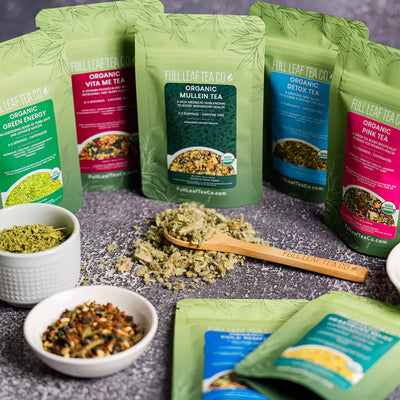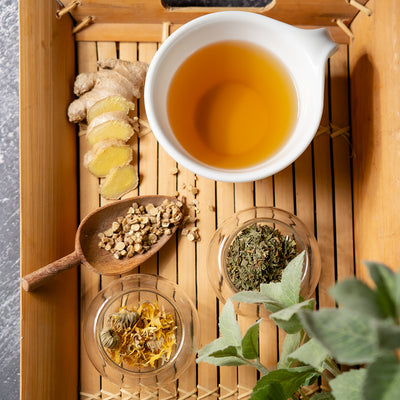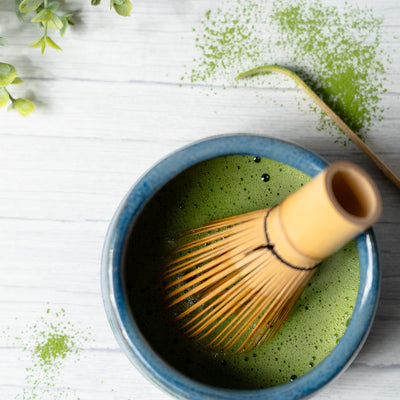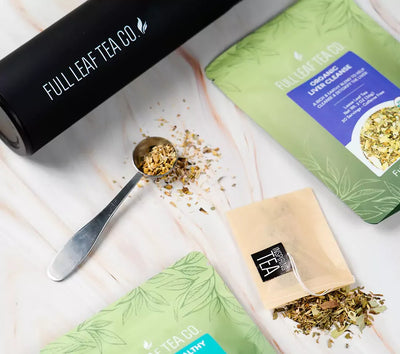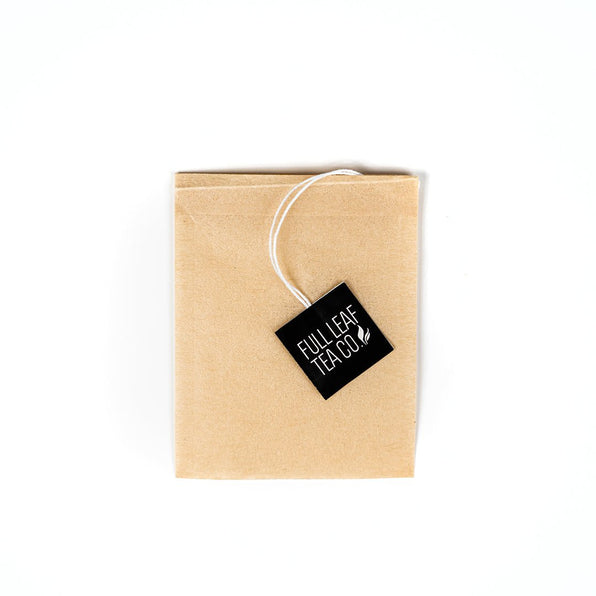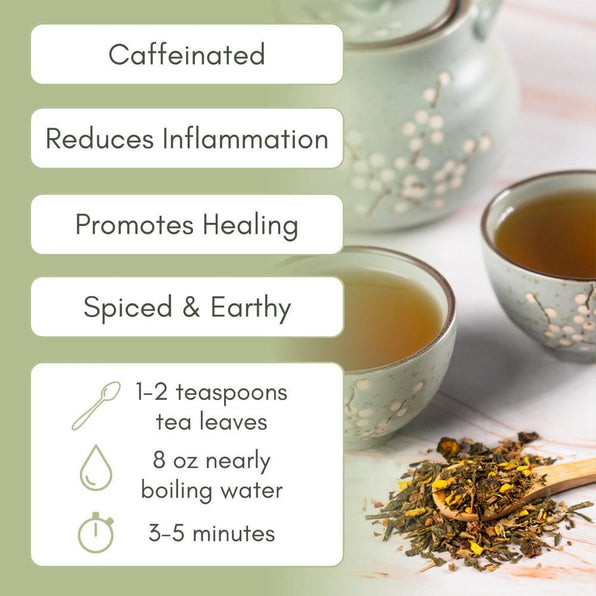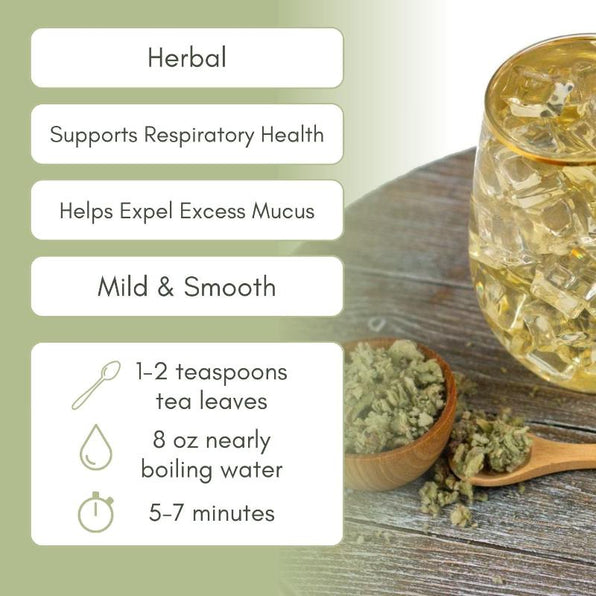Breathe Easier: Top 8 Herbs for Natural Allergy Relief

Seasonal allergies can bring on a storm of uncomfortable symptoms—sneezing, congestion, itchy eyes, and more.
While over-the-counter medications offer relief, many people turn to herbs for a gentler, more holistic approach to managing allergies. For centuries, herbs have been used to support respiratory health, reduce inflammation, and strengthen the body’s natural defenses against allergens.
Whether you're dealing with pollen, dust, or other irritants, these eight herbs can offer natural support for easier breathing and a calmer immune response.
Let's explore the benefits of herbs!
Organic Peppermint
The key component in peppermint is menthol, which acts as a natural decongestant by thinning mucus and opening up the nasal passages. Peppermint also contains rosmarinic acid, a compound shown to have anti-inflammatory and antihistamine-like effects, which can help reduce the body’s reaction to allergens (McKay & Blumberg).
The soothing effect of peppermint on the throat and sinuses makes it an ideal herb for addressing allergy-related discomfort like stuffy nose, sinus headaches, and scratchy throat.

Organic Nettle
Nettle leaf (Urtica dioica) is often called a natural antihistamine, and for good reason. This herb has been studied for its ability to inhibit the body’s histamine response—the chemical reaction responsible for itchy eyes, sneezing, and runny nose during allergy season.
Nettle contains bioactive compounds that can help decrease the release of histamine from mast cells, providing fast-acting support for allergic rhinitis symptoms (Roschek et al.). Unlike many pharmaceutical options, nettle does not typically cause drowsiness, making it a popular herb for daytime allergy relief.

Organic Ginger Root
Ginger root is a powerful anti-inflammatory herb that can offer significant relief for allergy sufferers. By reducing inflammation in the respiratory tract, ginger helps ease nasal swelling, sore throat, and sinus discomfort caused by allergic reactions.
Its warming nature also supports circulation and immune function, which can be helpful for managing systemic inflammation and oxidative stress triggered by allergens (Grzanna et al.). In addition to its immune-supporting benefits, ginger has natural antihistamine effects and can assist in clearing mucus from the lungs and sinuses.

Organic Licorice Root
Licorice root is a multifaceted herb with benefits that are especially helpful during allergy season. As a demulcent, licorice forms a soothing, protective coating over mucous membranes in the throat and respiratory tract, relieving irritation caused by constant coughing or post-nasal drip.
It also acts as an anti-inflammatory and immune modulator, helping calm overactive immune responses that worsen allergy symptoms (Wang & Nixon). Licorice’s adaptogenic properties mean it can help the body cope with stress, which often exacerbates allergic reactions.

Organic Sage
Sage is widely used for its ability to soothe sore throats and clear excess mucus, thanks to its astringent and anti-inflammatory nature. It contains flavonoids and phenolic acids with antioxidant and antimicrobial effects, helping to reduce the severity and duration of allergy-related symptoms (Ghorbani & Esmaeilizadeh).
Sage may also dry up runny noses and ease sinus drainage, making it especially useful during peak allergy season or when dealing with post-nasal drip.

Organic Ginkgo Biloba
Ginkgo biloba is best known for enhancing circulation and cognitive function, but it also has important applications for allergy relief. It contains antioxidant flavonoids and terpenoids that help reduce inflammation and protect tissues from oxidative damage.
Additionally, ginkgo may inhibit the activation of mast cells and the release of histamine, helping to calm allergic responses, particularly in the lungs (Kwak et al.). This makes it a valuable herb for individuals experiencing allergy-induced asthma or respiratory difficulty.

Organic Oregano
Oregano is a potent herb often used to support immunity and fight respiratory infections. It’s rich in carvacrol and thymol—two compounds with strong antimicrobial, antifungal, and anti-inflammatory effects.
Oregano may help reduce inflammation in the respiratory tract and sinuses while preventing bacterial overgrowth that can follow allergy congestion (Force et al.). Its expectorant properties also help loosen and eliminate mucus, offering further respiratory relief.

Organic Slippery Elm
Slippery elm is one of the most soothing herbs available, especially when it comes to calming irritation in the throat and upper respiratory tract.
It contains mucilage, a gel-like substance that coats mucous membranes, offering quick relief from dryness, coughing, or post-nasal drip. It’s particularly useful when allergies cause persistent throat irritation, and it’s safe and gentle for frequent use (Mills & Bone).

Organic Allergy Relief Tea
Our Organic Allergy Relief Tea is a soothing, all-natural blend crafted to help you breathe easier and feel better during allergy season. Combining the power of the eight potent herbs—peppermint, nettle, ginger root, licorice root, sage, ginkgo biloba, oregano, and slippery elm powder—this tea offers comprehensive support for relieving sinus pressure, calming inflammation, and easing respiratory irritation.
With every sip, you'll enjoy a comforting, herbal infusion that naturally defends against allergens and promotes clear, balanced breathing.
A Breath of Fresh Air, Naturally
You don’t have to rely solely on synthetic medications to get through allergy season. These eight herbs offer a natural, time-tested approach to easing allergy symptoms and supporting overall respiratory wellness.
Whether used individually or blended into an herbal tea, they can help you breathe easier and feel better, naturally.
Learn More About Allergy Relief Tea
Related Reading:
Resources
Force, Michael, et al. “Oregano: Properties, Composition, and Biological Activity.” Journal of Medicinal Food, vol. 3, no. 2, 2000, pp. 149–153.
Ghorbani, A., and Esmaeilizadeh, M. “Pharmacological Properties of Salvia officinalis and Its Components.” Journal of Traditional and Complementary Medicine, vol. 7, no. 4, 2017, pp. 433–440.
Grzanna, R., et al. “Ginger—An Herbal Medicinal Product with Broad Anti-Inflammatory Actions.” Journal of Medicinal Food, vol. 8, no. 2, 2005, pp. 125–132.
Kwak, W. J., et al. “Ginkgolide B Suppresses Inflammatory Responses by Blocking Nuclear Factor-κB and MAP Kinase Activation in Mast Cells.” Inflammation Research, vol. 58, no. 12, 2009, pp. 909–916.
McKay, D. L., and Blumberg, J. B. “A Review of the Bioactivity and Potential Health Benefits of Peppermint Tea (Mentha piperita L.).” Phytotherapy Research, vol. 20, no. 8, 2006, pp. 619–633.
Mills, S., and Bone, K. Principles and Practice of Phytotherapy: Modern Herbal Medicine. Elsevier Health Sciences, 2013.
Roschek, B., et al. “Nettle Extract (Urtica dioica) Affects Key Receptors and Enzymes Associated with Allergic Rhinitis.” Phytotherapy Research, vol. 23, no. 7, 2009, pp. 920–926.
Wang, Z., and Nixon, D. W. “Licorice and Cancer.” Nutrition and Cancer, vol. 39, no. 1, 2001, pp. 1–11.

